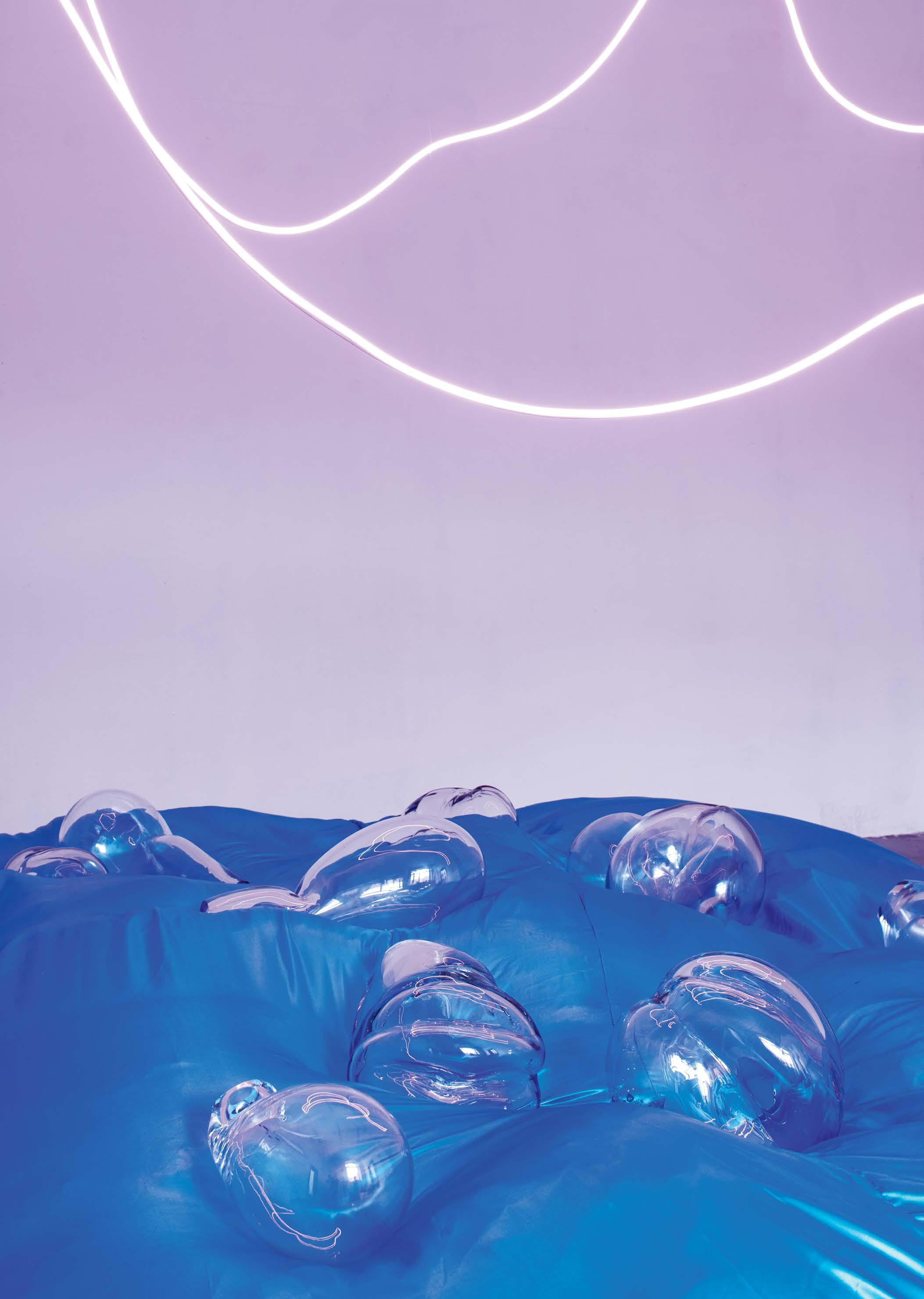
3 minute read
Sara Wollasch
Sara Wollasch (* 1997) se ve své tvorbě zabývá především tělesností, otázkami péče a hledáním nových forem soužití i spolupráce. Její práce odkazuje na lásku, hravost i humor, nalezneme zde ale i prvky sebeironie a určitý druh svébytné přirozenosti. Právě s tímto ryze přirozeným a intuitivním přístupem k životu se divák setkává během jejích performancí, ve kterých je mnohdy konfrontován s nahotou nebo stylizací autorčina těla. Z nedávných projektů lze v tomto kontextu zmínit například performanci Prsa (2021), ve které je nahota nástrojem boje proti různým formám sociálního či politického útlaku i projevem ženské síly. Lidské tělo jako primární prostředek komunikace se často prolíná s autorčinou sochařskou praxí a instalační tvorbou, odléváním částí těla ze sádry a zapojováním sochařských objektů jako svébytných aktérů jednotlivých happeningů a akcí, například v díle Venuše, pocta Kateřině Olivové (2022) nebo NEST (2023). Vedle objektových instalací se Wollash vyjadřuje také prostřednictvím videa, například v díle UNITED COLOURS OF (2022), které je součástí série videí, jimiž autorka reaguje na současné společensko-politické dění.
Wollasch také založila společně s Bárou Smékalovou umělecké duo NEWkus, jehož prostřednictvím od roku 2016 navazují komunikaci s širokou veřejností. Wollasch i Smékalová v něm experimentují s možnostmi tělově zaměřené performance ve spojení s kýčem, trash estetikou a výraznými kostýmy. Rané projekty uskupení se nesly zejména v duchu nutnosti reagovat na aktuální politické, sociální a kulturní dění, například u performance Syria Ambulance (2017), která byla okamžitou odpovědí na chemický útok v Chán Šajchúnu v témže roce. Veřejný happening COVID pochod (2021) do umělecké praxe NEWkusu přirozeně integroval i pandemickou situaci a tematizoval tělo jako veřejný a kolektivní útvar, který se během obtížných období stává objektem politické kontroly a sledování. V online výstavě Vězení (2020) autorky přizpůsobují své tvůrčí metody pandemickým podmínkám a odkazují na uměleckou disciplínu mail artu. Zvolenými postupy inklinují často k hravému až absurdnímu zadání, úkolům a výzvám, které se stávají předmětem pečlivé reflexe a dokumentace. V mnohých ohledech navazují na uměleckou tradici hnutí Fluxus a ohledávání možností nového, inkluzivního prostoru, ve kterém se stírá hranice mezi žitím a uměním.
Sara Wollasch je absolventkou Ateliéru tělového designu pod vedením Lenky Klodové a Ateliéru sochařství 2 u Jana Ambrůze a Pavla Korbičky na FaVU VUT v Brně. Absolvovala stáž v Ateliéru hostujícího pedagoga u Przemyslawa Kwieka, kde působila jako asistentka. Vedle řady performativních akcí představila svou tvorbu na výstavách především v kontextu nezávislé umělecké scény, například v pražské galerii Studia ALTA a Galerii Ferdinanda Baumanna nebo Vašulka Kitchen Brno. Účastnila se řady sympozií a festivalů, například Festivalu nahých forem, MFDF Jihlava nebo Malamut International Festival.
Eva Drexlerová
Sara Wollasch’s (* 1997) work is primarily concerned with physicality, questions relating to care and the search for new forms of coexistence and collaboration. Her work refers to love, playfulness and humour, but there are also elements of self-irony and a kind of peculiar nature. It is this purely natural and intuitive approach to life that the audience encounters during her performances, and they are often confronted with the nakedness or stylisation of the artist’s body. Recent projects in this context include, for example, the performance Breasts (2021), in which nudity is both a tool in the struggle against various forms of social or political oppression and a manifestation of female power. The human body as a primary means of communication is often intertwined with the artist’s sculptural practice and installation work; casting body parts from plaster and using sculptural objects as singular actors in individual happenings and events, as in Venus, a tribute to Kateřina Olivová (2022) and NEST (2023). In addition to her object installations, Wollash also expresses herself through video, for example in UNITED COLOURS OF (2022), which is part of a series of videos that react to contemporary socio-political events.
In addition to her own artistic work, Wollasch founded the artistic duo NEWkus with Bára Smékalová, through which they have been communicating with the general public since 2016. In NEWkus, the artists experiment with the possibilities of body-oriented performance in conjunction with kitsch, trash aesthetics and distinctive costumes. The pair’s early projects were mainly done in the spirit of needing to respond to current political, social and cultural events, as with the performance Syria Ambulance (2017), which was an immediate response to the chemical attack in Khan Sheikhoun in the same year. The public happening COVID March (2021) naturally integrated the pandemic situation into NEWkus’ artistic practice, thematizing the body as a public and collective formation that becomes an object of political control and surveillance during difficult periods. In the online exhibition Prison (2020), the artists adapted their creative methods to pandemic conditions and reverted to the artistic discipline of mail art. Their chosen methods often tend towards playful and even absurd assignments; tasks and challenges that become the subject of careful reflection and documentation. In many ways they draw on the artistic tradition of the Fluxus movement and the exploration of the possibilities of a new, inclusive space in which the boundaries between life and art are blurred.
Sara Wollasch graduated from the Body Design Studio under Lenka Klodová and the Sculpture Studio 2 under Jan Ambrůz at the FFA BUT. She completed an internship at the Visiting Teacher’s Studio under Przemyslaw Kwiek, where she worked as an assistant. In addition to several performative events, she presented her work at exhibitions, mainly in the context of the independent art scene, such as the Studio ALTA Gallery and Ferdinand Baumann Gallery in Prague and Vašulka Kitchen Brno. She participated in several symposia and festivals, such as the Festival of Naked Forms, MFDF Jihlava, and Malamut International Festival.










